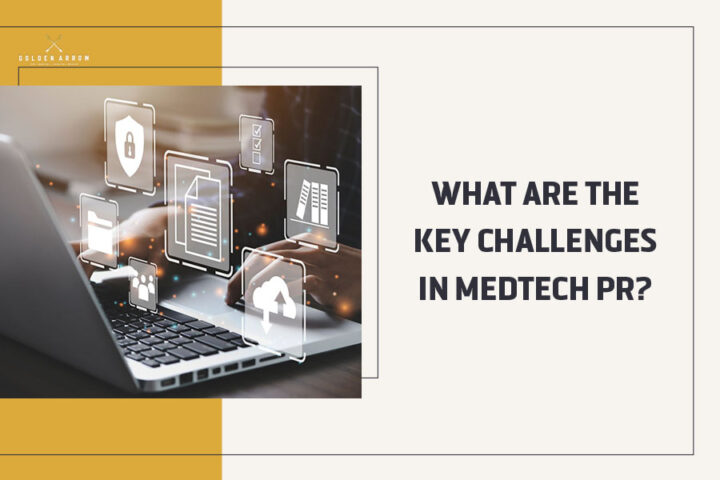With the advancement of medical technology, it is becoming challenging to acquaint the public with all the novelties and revolutionary innovations. Because of that, Medtech PR plays a huge role in bridging the gap between the public and innovation. So, let’s see what are the key challenges in Medtech PR and what strategies are used to improve communication with the public.
Keep reading as we will analyze the key problems and challenges PR practitioners face and the effective strategies for solving such problems.

What Are the Key Challenges in Medtech PR?
Although the work of a PR agency for medical technology is an active communication related to innovations in the medical industry, certain challenges can still be faced. Such challenges include ethical considerations, handling sensitive issues, building credibility, and communicating technical information.
So, what are the key challenges in Medtech PR, and how can you recognize them? In the following, we will analyze the most common challenges and refer to potential solutions that can overcome such problems.
Regulatory complexity
Strict regulations are an important element in regulating the medical industry while ensuring patient safety and the quality of service and products.
Because of that, your Medtech PR must adhere to the strict guidelines set by the FDA in the United States and the CE marking in Europe. Compliance with such regulations can sometimes be quite complex and time-consuming thus making this among the challenges of PR for medical products.
Communicating technical information to non-technical audiences
To convey to the public, public relations professionals should have an excellent knowledge of complex medical jargon and the latest medical advances.
Additionally, Medtech PRs need to find a way to simplify complex medical information without confusing and understandably conveying the information for caregivers, patients, and future investors.
Handling sensitive issues
The privacy of health data is one of the sensitive branches of any healthcare company. In that regard, the main challenge in the Medtech sector is managing crises, data privacy, and security concerns.
If negative events lead to violating personal data, PR teams should be prepared to deal with them. A special challenge for healthcare PR teams in such situations is to be transparent while preserving the public’s reputation and trust.
Building credibility and trust
Health is a primary concern for people, so you must pay attention to reliability and credibility. Medtech PR can convey such credibility in multiple ways, such as presenting medical studies, regulatory approvals, promoting medical devices or new technology in real stores, etc.
With the development of the medical industry, many companies are entering the game, and the competition is increasing. By carefully creating PR strategies that will encourage public trust, your company will stand out from the rest of the competitors.
Balancing innovation with ethical considerations
Innovations in the Medtech industry, such as the inclusion of AI, raise many questions related to patient data security and other ethical issues. Thus, it is very important that your PR medical teams cooperate with ethical review committees and boards to ensure that new technologies meet all ethical standards.
Their approach should also be patient-centric, emphasizing the patient’s benefits from new technologies while protecting patients’ privacy and rights.

Strategies for Overcoming Medtech PR Challenges
To successfully overcome the challenges facing Medtech PR, several strategies can help you build trust and credibility. Below, we will mention some of the most important factors that can help overcome problems in Medtech:
Proactive communication
PR professionals must be aware of potential challenges and address them before they escalate. It can be done through:
- Stakeholder relations – PR professionals must build strong relationships with stakeholders such as investors, healthcare professionals, and regulators to overcome potential risks. Regular communication will thus foster transparency and trust.
- Anticipating problems – A key attribute of PR professionals should be anticipating potential problems promptly. Such professionals should develop strategies and plans for their binding and effective resolution through constant communication with the relevant factors.
- Crisis preparedness – Medtech PRs should also be prepared for a potential crisis. Namely, PR professionals should have prepared plans with clear communication protocols during challenging situations.
Education and training
Empowering PR professionals with education and training is crucial for managing the Medtech industry’s challenges, employing strategies such as:
- Spokesperson training – Providing media training to key executives and spokespeople will enable effective communication with journalists and the public.
- Industry education programs – Such programs relate to the Medtech sector and may address specific topics and challenges it faces. Basically, the programs focus on the industry’s key elements, ethical considerations, and compliance with the regulation.
- Functional collaboration – Functional collaboration across stakeholders in the Medtech industry aims to develop a clear strategy and better functionality. For this purpose, collaboration between PR professionals, product or service development teams, and regulatory affairs is encouraged.
Transparency and authenticity
- Open communication – PR experts need to communicate openly and transparently about product development timelines, potential clinical trial results, and compliance with strict regulations. This will build trust with investors, patients, and healthcare professionals.
- Humanizing Medtech innovation – Humanizing innovation is a way to show real-world situations where Medtech has positively changed patients and healthcare.
- Stakeholder involvement – Actively involving stakeholders such as healthcare providers, patients, and investors will help obtain feedback on current issues in the industry, making it easier to locate and solve problems.
Leveraging digital platforms
Digital platforms are a powerful PR tool for Medtech professionals who can strengthen their credibility and communicate their messages to the public. They are a great place to find effective solutions to current problems in the industry and to develop cooperation with potential investors. Such platforms can be used in several ways:
- Online engagement – By actively participating in online forums related to healthcare, PR professionals can learn about everyday problems in the Medtech industry and ways to solve them. In addition, they can build good relationships with prominent industry figures who can share their experience.
- Social media – A presence on social media will allow for highlighting achievements and innovations and involving stakeholders if there are unclear issues.
- Content marketing – Through online marketing, the public can more easily stay up to date with the latest developments in the Medtech industry. Such content marketing can include blogs, videos, and articles to educate the public about the progress of medicine and the application of the latest trends to improve health care.

Conclusion
Medtech PR often encounters challenges that can negatively affect the medical industry’s work. Such challenges may relate to difficulties in communication, conveying complex medical terminologies to the public, security challenges, and so on.
Identifying what are the key challenges in Medtech PR will help you find more easily efficient solutions that will enable increased credibility, trust, and a positive relationship with stakeholders.


